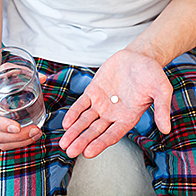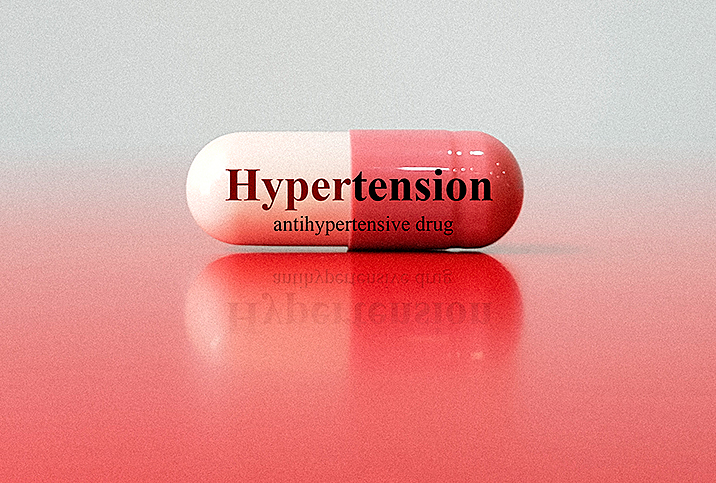These 4 Drug Types Can Contribute to ED—Each Has a Workaround

Medication isn't the usual suspect for erectile dysfunction (ED). The condition is most often caused by factors such as age and systemic diseases, including diabetes, hypertension and other cardiovascular diseases, according to S. Adam Ramin, M.D., a urologist and the medical director of Urology Cancer Specialists in Los Angeles.
However, certain medications can exacerbate or even cause new-onset erectile dysfunction. Given that, you should know basic details about which drugs can cause ED––and what you can do to minimize the impact of the medication.
Blood pressure meds
Blood pressure medications are linked to erectile dysfunction because a majority operate by lowering blood pressure and, thus, decreasing the flow of blood to the penis, said Brian Norouzi, M.D., a urologist with Providence St. Joseph Hospital in Orange County, California. "Beta blockers can be particularly offensive, as well as diuretics."
While there is an association between medications used to lower blood pressure and ED, what's most important to understand about the link is that hypertension (elevated blood pressure) itself is also highly associated with erectile dysfunction, Ramin noted. As a result, the medication is not necessarily the root cause of ED.
"It may just be that the progression of their hypertension disease has caused the erectile dysfunction," he said.
Taking blood pressure medication is important to prevent some risks of hypertension, such as heart attack or stroke, so if you're experiencing erectile dysfunction and are on blood pressure meds, it's vital to keep taking them.
"Not taking antihypertensives is not okay," Ramin said. "In fact, untreated hypertension has a much higher risk of causing erectile dysfunction than treated hypertension on medications."
Instead of looking for alternative therapies on your own, or discontinuing your meds if you develop erectile dysfunction, be sure to continue taking them and talk to your doctor about other options you may have.
For instance, Ramin noted a solution could be as simple as switching from one class of hypertensives to another or implementing lifestyle changes such as a better diet, exercise and stress management techniques. To support that contention, a 2018 study in Sexual Medicine journal found exercise was helpful in decreasing erectile dysfunction among men with hypertension.
Antidepressants
Another possible association can be found between medications used for depression and erectile dysfunction, Ramin said. This link presents a challenge because there's no singular medication implicated in the development of ED, rather basically all of them, he said.
"Almost every antidepressant medication has been shown to potentially affect erections, both directly—related to brain effects––or indirectly, potentially due to higher serotonin levels in the peripheral tissue and lower release of nitric oxide at the penile level," Norouzi said.
He further explained antidepressants can also affect the autonomic nervous system, which controls erectile and orgasmic function.
Additionally, like with hypertension, depression itself can impact libido and sexual function, so the conversation starts to veer into the chicken-or-the-egg territory. Just like with hypertension, it's important to address the underlying medical condition first, while tailoring treatment with your doctor's help to minimize the impact on erectile function.
"It's often a matter of balancing the risk of a medication change versus the perceived benefit of the original prescribed drug," Norouzi said. "One's physician should listen to what is exactly occurring and decide if the medication has a likelihood of causing the problem, then get in a frank discussion about the risks of potential alternatives."
Cancer treatments
Treatment for some types of prostate cancer involves certain types of medications that reduce testosterone levels—prostate cancer feeds on testosterone—and, as a result, can impact sexual function.
These meds are most commonly finasteride or dutasteride, which are 5-alpha reductase inhibitors that can cause loss of libido or function because they convert testosterone to dihydrotestosterone (DHT), another sex hormone, Norouzi explained.
In these situations, a workaround will depend on the severity of the prostate cancer. Norouzi noted that in cases where prostate enlargement is not too severe, saw palmetto or an alpha blocker may be used. Additionally, an erectile dysfunction medication such as Cialis could help, as could therapy and exploring other forms of intimacy with your partner.
Narcotic medications
Narcotics can be linked to erectile dysfunction in two main ways: directly, by dulling the senses, or indirectly, by affecting liver function and hormone production. Without adequate hormone production, testosterone may be lowered to the point where it decreases libido and erectile function.
As seems to be the trend with all of the medications discussed, Norouzi noted narcotic pain medications are "complicated" in terms of their involvement with erectile function, because the type of pain they treat can also cause ED. If the pain needs to be addressed, alternative therapies such as acupuncture or other nonnarcotic strategies should be attempted.
Narcotic medications can cause erectile dysfunction, but once someone stops taking the narcotics, the erections should return, Ramin said.
Talk to your doctor about ED
Exploring all possible causes of erectile dysfunction is an important conversation to have with your doctor, but Ramin cautioned men to keep in mind that while medications can make an existing problem worse, the baseline problem behind ED is the true focal point. For instance, if you're taking medications for diabetes or cardiovascular disease, it's important to focus on addressing those issues first.
"That patient who haphazardly changes his health plan may get erections up until the time his heart suffers injury from a poorly executed substitution, and sexual function may be the least of his concerns after that," Norouzi said bluntly.
If you're having new-onset erectile dysfunction, it's vital to uncover what's causing it. In fact, Ramin noted that ED can be one of the first symptoms of coronary artery disease in a man.
"It's important for men to always take erectile dysfunction seriously and get checked out," Ramin said.




















